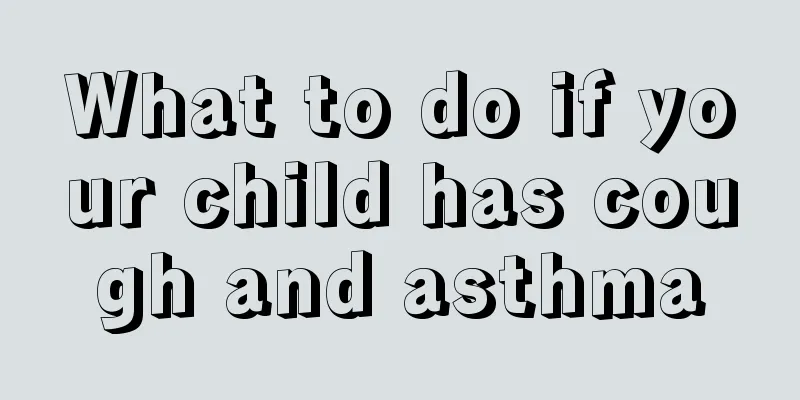Symptoms of milk allergy in newborns and ways to prevent allergies

|
It is not easy for newborns to be allergic to milk, but if eczema, sneezing, the child refuses to drink milk, and diarrhea occurs, you should pay attention to the possibility that the child is allergic to milk. Severe cases may even cause shock. The symptoms are obvious after feeding. Parents can observe the child in time to see if he is allergic to milk. The severity of the child's symptoms can be clearly discovered, so parents do not need to worry too much. 1. Symptoms of milk protein allergy Generally, if babies show similar symptoms after drinking milk, parents should pay attention to whether their children have allergies! Clinical milk protein allergy mainly affects the skin, gastrointestinal tract and respiratory tract. The sick baby may develop rashes, hives or eczema on the skin or body; as for the trachea, it is common for babies to have excessive phlegm, sneezing, coughing or wheezing. Sick infants often have abdominal colic, vomiting and diarrhea in their gastrointestinal tract. They often cry and become restless after feeding. Although diarrhea is common, the degree of diarrhea varies greatly. From intermittent mild diarrhea to severe cases, the disease can cause intestinal mucosal atrophy and malnutrition. On the other hand, the baby may refuse to feed or even cry, which may cause shock in severe cases. The symptoms of a cow's milk protein allergy vary from person to person. Symptoms can occur immediately after drinking milk or may only begin to appear after several hours or even days. If a child with allergies has one or more allergic symptoms, parents should consult a doctor immediately: Category 1: Initial reaction - appears 45 minutes after drinking milk, symptoms such as: abdominal cramps, diarrhea, vomiting, rash, eczema, occasional wheezing or sneezing. Category 2: Mid-term reaction - occurs 45 minutes to 20 hours after drinking milk. Symptoms such as vomiting and diarrhea Category III: Late reaction - appears 24 hours after drinking the milk. Symptoms include: diarrhoea, vomiting, wheezing or coughing. Therefore, breastfeeding is the only way to keep your baby healthy, and it is recommended to give your baby at least four to six months of breast milk to prevent the occurrence of allergic symptoms in your baby. Women with allergies must pay attention to their diet to reduce the chance of their fetus developing allergies. After the baby is born, the mother's diet should be more strict: avoid eating foods that are likely to cause allergies, such as eggs, milk, fish, peanuts, wheat, shellfish, etc. How to prevent cow's milk protein allergy: Green, healthy, smoke-free and pollution-free living environment. Breastfeeding infants 4 to 6 months. Breastfeeding mothers should not eat peanuts, eggs, seafood and other foods that may cause allergies. Milk protein allergy will still occur. Parents must know how to prevent milk allergy in newborns. A healthy and green environment and attention to improving children's immunity can effectively prevent the occurrence of milk allergy. The same is true for breast milk. Mothers should try to avoid eating peanuts, seafood and other foods that are prone to allergies before breastfeeding. |
<<: Causes and treatment of decreased appetite in newborns
>>: Symptoms, prevention and treatment of cow's milk protein allergy in newborns
Recommend
Causes of convulsions in children
Some people will experience convulsions inadverte...
What are the dangers of tonsillectomy?
Tonsils are an organ that is very helpful for us ...
What are the symptoms of zinc deficiency in ten-year-old children?
Children always have abnormal symptoms for no rea...
How old does a baby start to grow molars?
The baby has been constantly changing since he ca...
What should I do if my two-month-old baby has a white coating on his tongue?
When the baby is still breastfeeding, white coati...
Examination of recurrent fever in children with pneumonia
In fact, in daily life, many parents are busy wit...
The baby's left side is big, which side should he sleep on?
Women need to do a lot of preparation before gett...
What is the reason for the child to have a red birthmark?
Every parent hopes that their baby will be born h...
What are the causes and treatments for hiccups in children?
Sometimes we all burp when we eat too fast or dri...
Why do children lose their teeth but don't grow back?
We must pay attention to our daily diet. The main...
Why do children keep spitting up milk?
For many new parents, taking care of a newborn ba...
What fruits should children with tracheitis eat?
Bronchitis is a very common disease, especially f...
Bacteremia in children
Bacteremia will occur in people of different age ...
The dangers of using a duckbill cup
Many parents think that children's supplies a...
What to do if children have itchy bumps on their bodies in summer
Summer is relatively humid, and children are part...









